
Guests
- Laura Carlsendirector of the Mexico City-based Americas Program of the Center for International Policy.
- Elena Poniatowskafounder of the newspaper La Jornada and one of Mexico’s most beloved writers. She’s the recipient of the Cervantes Prize, the most prestigious literary prize in the Spanish language.
The Mexican government has moved toward extraditing drug lord Joaquín “Chapo” Guzmán to the United States after his recapture in Mexico on Friday. Guzmán’s drug cartel is said to be one of the most powerful in the world. But it’s unclear how much of an impact his arrest will have on a drug war that has killed tens of thousands in Mexico over the past decade. Critics say that if sensible drug laws were established in Guzmán’s chief market—the United States—drug lords like him would not be in business. We are joined from Mexico City by two guests: Laura Carlsen, director of the Mexico City-based Americas Program of the Center for International Policy, and Elena Poniatowska, a founder of the newspaper La Jornada and one of Mexico’s most beloved writers.
Transcript
AMY GOODMAN: The Mexican government has move towards extraditing drug lord Joaquín “Chapo” Guzmán to the United States after his recapture in Mexico on Friday. El Chapo managed to escape a safe house through drains and tunnels, and steal a car, before Mexican forces nabbed him as he fled. Footage of the operation on the safe house released on Monday show an intense gunfight that left five suspects dead.
Guzmán is now held at the maximum-security Altiplano prison—the same prison he escaped from through a tunnel dug under his cell six months ago. He had also previously escaped from prison in a laundry cart in 2001. The United States had sought to extradite him before his most recent escape, but Mexico refused. The embarrassment of Guzmán’s getaway last year has raised pressure on the government of President Enrique Peña Nieto and sparked questions about its vulnerability to corruption. Guzmán is said to have been aided by paid informants and accomplices on the inside.
But his capture this time may have been his own doing. Mexican authorities say they were helped in their investigation by Guzmán’s communications while in hiding, including with actor Sean Penn. Guzmán apparently agreed to do an interview with Penn for Rolling Stone as part of a bid to turn his life story into a movie. He also reportedly had a strong personal interest in the Mexican actress who arranged the meeting, Kate del Castillo. In this excerpt from Penn’s interview, Guzmán responds to a question about the harms caused by drugs.
JOAQUÍN “EL CHAPO” GUZMÁN: [translated] Well, it’s a reality that drugs destroy. Unfortunately, as I said, where I grew up, there was no other way, and there still isn’t a way to survive, no way to work in our economy to be able to make a living.
AMY GOODMAN: Guzmán is challenging his potential extradition to the U.S., a process that could take well over a year. His drug cartel is said to be one of the most powerful in the world, but it’s unclear how much of an impact his arrest will have on a drug war that’s killed tens of thousands in Mexico over the past decade. Advocates say if sensible drug laws were established in Guzmán’s chief market—the U.S.—drug lords like him would not be in business.
Well, for more, we’re going directly to Mexico City, where we’re joined by two guests. Laura Carlsen is director of the Mexico City-based Americas Program of the Center for International Policy. And Elena Poniatowska is with us, founder of the newspaper La Jornada, one of Mexico’s most beloved writers. She is the recipient of the Cervantes Prize, the most prestigious literary prize in the Spanish language.
We welcome you both to Democracy Now! Elena Poniatowska, let’s begin with you. Your reaction to the capture of Guzmán and how he was captured?
ELENA PONIATOWSKA: Yeah, well, he’s the king of tunnels, as you can see, and he was captured. I think he was followed by the Mexican government everywhere ever since he—when he flew away the first time, no? And it’s being—they treat it—they treat this event as if it was a national victory, which it is not. It is only—it is only something that distracts Mexico from the politics, the bad politics, of a bad government.
AMY GOODMAN: Laura Carlsen, can you talk about what actually happened on January 8th, how he was captured, what makes this different from his previous arrests and his two previous escapes?
LAURA CARLSEN: He was—
ELENA PONIATOWSKA: Well, he was captured in, as you—as we all know, he was captured while he was escaping. And in the north, he’s very well loved by people. He’s considered a hero by many poor Mexicans that have benefited from him, as in Colombia Colombians used to benefit of Pablo Escobar. I mean, really, the drug dealers become kings in Latin America—not only in Mexico, in Colombia, wherever they are—because they do what the government doesn’t do. In many cases, they help poor people, and people love them. They are a kind of a Robin Hood, of course.
LAURA CARLSEN: So, he was captured in his home state of Sinaloa. And the Army—the Navy, rather, which has been the preferred security force of the United States—and we’ve seen lately that it’s the Navy that carries out these kinds of operation, because they’re more trusted and more supported with the cooperation from the U.S. government—moved in, in a private residence. Again, as Mrs. Poniatowska mentioned, he is the king of tunnels, and so he escaped the shootout in the residence and went down into the sewage system. He then later came up through a manhole, took a car and was captured on the highway. And one of the big differences we see in this case, compared to the capture previously in 2014, which many people, including myself, thought was probably the result of a prearranged agreement, is that he was really on the run. And there was violence in this one. There were five people killed, as opposed to the bloodless capture the last time. So, it was—it looked more like an authentic operation.
AMY GOODMAN: And, Laura Carlsen, can you talk about what you see as the significance of his capture and the U.S. requesting his extradition, what he means in Mexico?
LAURA CARLSEN: This high-profile capture will have absolutely no impact—unless it’s a negative impact—on the violence and organized crime caused by prohibition, both here in Mexico and in the United States. We already know this. The kingpin strategy of taking out the drug lords, the high-level drug lords, in order to supposedly dismantle the drug trafficking organizations and the illegal trade, has never worked. And here in Mexico, it’s well documented that it leads to more violence. What we often see is that a cartel faces turf wars. It faces challenges from rival cartels after a leader is taken out, and in some areas the rivals see the parent cartel as weakened, and/or it suffers a process of fragmentation, where smaller cartels break off and they turn out to be more violent and more dangerous to the public than the original one. So what we can really, unfortunately, expect from this is a setback, and a setback in the sense that it’s all over the news, and the capture of El Chapo is presented as this huge victory, and what it does is it reaffirms this drug war policy of the U.S. and the Mexican governments that’s led to the death of more than 100,000 Mexicans.
AMY GOODMAN: What could reduce the violence, Laura?
LAURA CARLSEN: There are a lot of proposals out there, and one of them is legalization in the United States, because it’s prohibition that creates these illegal markets that are, of course, occupied by criminals, by definition. And so, as those are taken out of their hands, their financial empire is reduced, and they have less power to buy the guns, to recruit the young people, to buy the politicians and to operate freely the way they do here.
Another, of course—and this is something that Mrs. Poniatowska has written on—is ending the corruption, because what we’re seeing here is maybe a victory, but in a war that’s lost. And it’s a war that in many ways is not even being fought, because the Mexican government is so invested, on all levels, in organized crime, that the impunity rates continue to be 98 percent. You can put somebody like El Chapo behind bars, but what about all the other criminals? What about the 26,000 disappeared who haven’t been found? Those are the root problems that she mentions, that we’re be distracted from because of all this media blitz on the capture of El Chapo.
AMY GOODMAN: We’re going to talk about that in a minute, but I wanted to ask you, Elena Poniatowska, to expand on Laura’s point.
ELENA PONIATOWSKA: Well, for the Chapo, it’s worse, it’s very bad for him, as a man, to be in prison in the United States, because in Mexico you can get away from prisons very easily. And he can do it better than anyone else. And besides, prisons in Mexico are very different from the prisons in the United States. And here, El Chapo, besides being admired by all the poor people, has many, many friends. And I’m sure he has friends in the government.
AMY GOODMAN: And before break, I wanted to get a comment from each of you on Sean Penn and the interview that he did with El Chapo, his secret meeting with him a few months ago, and whether you believe that it was his meeting with him that led to his arrest. Elena Poniatowska?
ELENA PONIATOWSKA: It’s obvious it was. Sean Penn went to see him and had an interview through this new Malinche, this new woman who gives her country to—as Malinche did it to Hernán Cortés, to the Spanish conquerors. So she gives him—she has this opportunity. She’s done movies on drugs herself. So she’s a intermediary—I don’t know how you say it in English. No, she’s a go-between. And she is the one who—
AMY GOODMAN: The intermediary.
ELENA PONIATOWSKA: Yes, she is that. She is the intermediary. Well, the go-between was a very beautiful picture, movie picture. And this is not very beautiful at all.
LAURA CARLSEN: No. It’s this—
AMY GOODMAN: You’re talking about Kate del Castillo.
LAURA CARLSEN: Right, right. So this is another sideshow. And, in fact, the attorney general said that it did indeed have to do with his capture. And what you see here is really what happens when two massive male egos get together: El Chapo, in this case, wanting to do a biopic and smitten with the actress Kate del Castillo, and Sean Penn looking for the adrenaline shot the same way. But, of course, the response of Mexican people is like, “OK, so how did two actors drop in on El Chapo Guzmán, the most wanted man by the U.S. and Mexican governments, when both governments have been searching for him, oftentimes for months, for years?” And again, that raises the question that the capture of El Chapo has never really been about how, and these complicated and sophisticated operations, but simply when. And that’s why Mexican people are so skeptical about the timing of this and the fact that it could really have a lot more to do with raising the image of the president, Enrique Peña Nieto, than with any huge victory in the drug war.
AMY GOODMAN: Although Hollywood has been abuzz about Sean Penn’s interview with El Chapo, some have begun to question the ethics around the article, which was published by Rolling Stone. Speaking at the Golden Globes, actor Alan Cumming questioned whether the article was really journalism or a celebrity stunt aimed at securing the rights to a biopic.
ALAN CUMMING: But I don’t know that it’s—I don’t understand how he and Rolling Stone can have sanctioned him going to meet that guy, who is a wanted fugitive, and then that—then not to tell the authority. You know, I don’t really know enough about it yet, but I do think it’s a bit dodgy. And I’m not sure that I think the idea of newspapers or magazines allowing correspondents to go and talk with people who are wanted for very heinous crimes and—you know, I don’t know. It’s just—and especially someone who’s a movie star. The whole thing is a bit weird. But I’m sure it will make a great film. Maybe I’ll play Sean, or maybe I’ll play El Chapo. I could do El Chapo. I can get a tan. I could pull it off. Me and Cate Blanchett could do it. She could play Sean, and I’ll play the drug dealer.
AMY GOODMAN: That was the actor Alan Cumming. Elena Poniatowska, you’re a leading journalist in Mexico. You are the founder of the newspaper La Jornada. You know, it may well be that Sean Penn and Kate del Castillo’s interview with El Chapo led to his capture, but what are your thoughts?
ELENA PONIATOWSKA: About what’s happening? My thoughts—
AMY GOODMAN: About the interview, about Sean Penn meeting with him.
ELENA PONIATOWSKA: Well, I think it’s a big show that is for Mexico that distracts us from the real problems. I think it’s just—the capture, many—I think six months ago, no? It was really good news. It was news. And now it’s just a story that you make up for magazines. That’s what it is, no? Afterwards, it will be a story for jokes, and it’s a story—it’s not—I don’t think it has any real depth or importance.
LAURA CARLSEN: Yeah, I think the journalist ethics are highly questionable here. And in fact, I don’t think that this started out or principally was a journalistic endeavor. I don’t think that the article had really much to do with this meeting. This was about getting together a producer—because Sean Penn is primarily an actor and producer, not a journalist, and you could tell that by reading the article—and an actress, a beautiful actress, to talk about doing this biopic. So that raises even more journalistic questions. Yes.
AMY GOODMAN: We’re going to go to a break, and when we come back, we’ll continue with our discussion. Laura Carlsen, thanks for joining us, Center for International Policy. And, Elena Poniatowska, we’d like to ask you to stay with us as we about the politics of Mexico. After that, we will come back to New York to speak with the man who filmed the death of Eric Garner. The only one to be criminally charged in Eric Garner’s—in this case are not the officers, but the man who filmed the death. Stay with us.

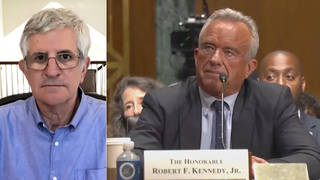
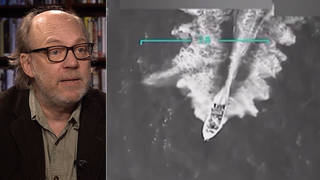
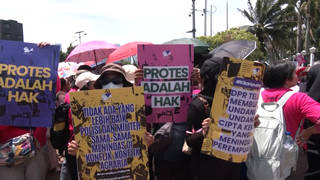






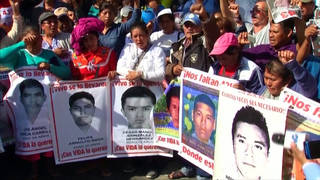
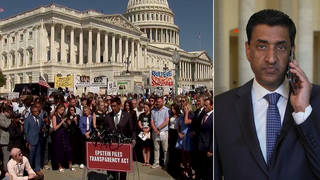
Media Options